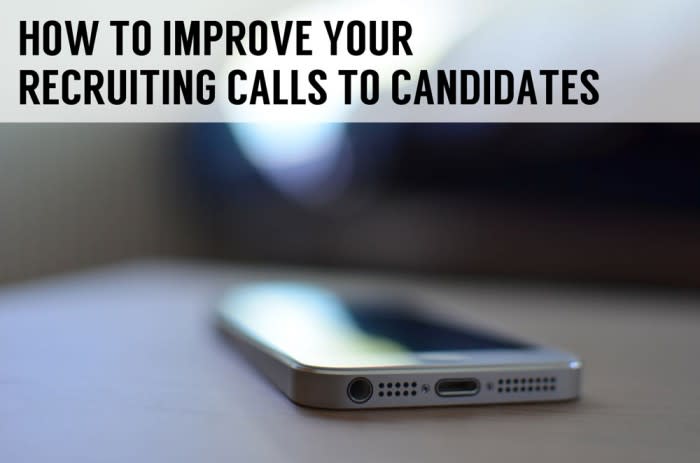
How to Improve Your Recruiting Calls to Candidates
There’s no doubt about it – telephone interviews are quick, easy and can tell recruiters a great deal about the candidate. In other words, they’re a perfect method for initial candidate screening. There are several things, however, that every recruiter should know before picking up the phone and initiating the first contact with a potential candidate. Here are a few pointers on how to improve your telephone interviews.
The first minutes of the call
If you’re calling a candidate, it usually means that you believe the might be qualified for the job. The first minutes of every telephone interview are essential for establishing a relation – especially if it’s a cold call and the candidate doesn’t expect you to contact them.
After a short phase of background information checking, you can proceed to fish for all the information that you need to ensure that the candidate is really qualified for the job. You need to provide a wealth of appropriate information to capture the candidate’s attention and make this conversation worth their time.
Figure out what drives candidates
In order to conduct an efficient phone interview – especially with “passive candidates” – you’ll need to have a clear idea about what interests them and motivates them when it comes to their professional growth. Sometimes those points can be found in their resumes under Career Objectives, but most of the time, you’ll have to figure them out.
In order to gain this knowledge, it’s best to situate your candidate pool to a specific market segment – data from demography, geography and psychography are essential here. Find out what it is that drives them and use it to inform your call.
Know what you’re offering
Captivating a candidate’s attention isn’t easy – remember that it was their killer skills that brought them to your attention, so the candidate will likely be in contact with other hiring managers.
Your proposition needs to stand out and be interesting – the right presentation of the position may lead to an interview and a job offer. Sell it well and you’ll see your candidate’s tone change from mildly-annoyed-for-being-disturbed to curious and engaged.
Understand the skills in question
There’s no point in you calling a candidate if his or her skills present no value to the position you’re offering. Make sure you know very well which skills are essential to perform the job and how they relate to general career goals of candidates.
Networking opportunities
Even if you’re in the middle of your call and already know the candidate’s skills don’t match the requirements of the job offer, don’t hang up the phone. These candidates might not themselves be fit for the job, but they might know someone who’s both qualified and looking for interesting career opportunities.
Every phone call – including a conversation with a qualified candidate who refuses your offer – can be transformed into a viable networking opportunity, allowing you to connect with other professionals and gain referrals in the process.
Telephone interviews offer a completely different dynamic of interaction than traditional face-to-face meetings, so it’s important that you know how to make the most of them.
Clearly, every phone call offers a chance for building your candidate database and improves your understating of the market.
Monique Craig is an Australian blogger and marketing specialist, who works for Oneflare, an Australian online marketplace, which connects customers with service providers.





